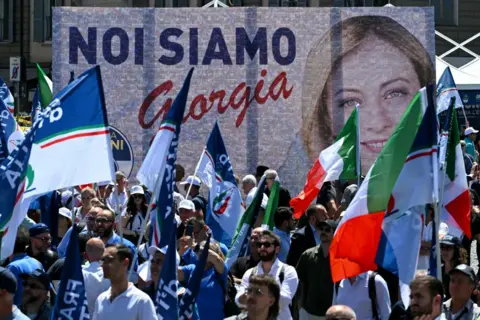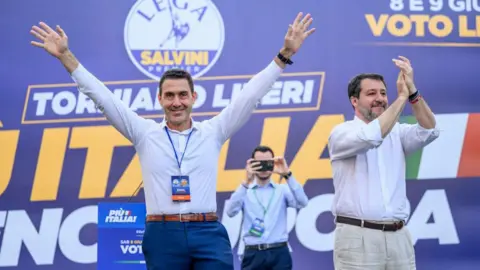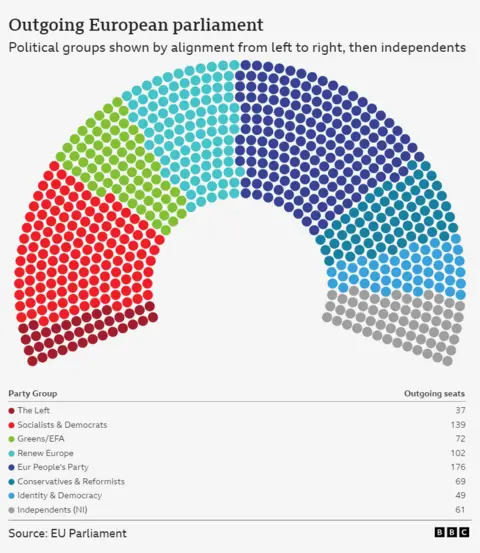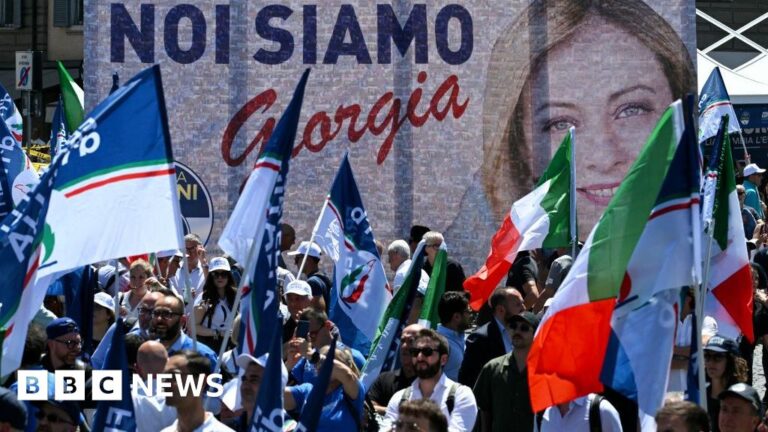By Laura Gozzi, BBC News, Rome
 Getty Images
Getty ImagesItalians began voting on the third of four days of European elections held in 27 EU countries.
Although the vote is on the next European Parliament, Italian Prime Minister Giorgia Meloni hopes the result will strengthen her grip on Italian politics. She even urged voters to “just write Giorgia” on their ballot.
Most EU countries will vote on Sunday, after a turbulent few weeks in which two EU leaders and several other politicians were physically attacked.
Danish Prime Minister Mette Frederiksen was attacked in the street in Copenhagen Friday evening, before the Danish vote on Sunday.
She suffered mild whiplash, according to her office, and a suspect was taken into custody.
Leaders across Europe united in shock over the latest attack, amid an election involving 373 million potential European voters.
Last month, Slovak Prime Minister Robert Fico survived an assassination attempt and only recently was he allowed to leave the hospital. Several German political figures have also been targeted.
These elections are not supposed to have an impact on national politics, but the reality is very different, especially in Italy.
Ms Meloni, who leads the far-right Brothers of Italy (FdI) party, was appointed prime minister in 2022 and has taken the rare step of putting her name at the top of her party’s lists, although she has not no intention of running for office. seat in the European Parliament.
Giorgia Meloni has enjoyed steady poll results since becoming prime minister in 2022, supported by a fragmented centrist and left-wing opposition and the gradual decline of her coalition partner, Matteo Salvini’s once-powerful Populist League, whose voters are attracted by the appeal of the FdI.
In a bid to reverse the trend, Mr Salvini has pushed his party’s discourse even further to the right.
The League’s election posters – denouncing all sorts of EU-backed initiatives, from electric cars to caps attached to plastic bottles – have attracted a certain amount of ridicule, but also considerable attention.
 Antonio Masiello/Getty Images
Antonio Masiello/Getty ImagesMr Salvini’s lead candidate, Roberto Vannacci, had the same effect. The army general was fired following the self-publishing of a book in which he expressed homophobic and racist views. Since he was a candidate for the League, he has doubled his stake.
Hardly a day goes by without Roberto Vannacci’s messages being amplified by the media. That could translate into votes for the League, but if it doesn’t, trouble could be in store for Mr Salvini, whose leadership is beginning to be called into question.
The same scrutiny will be applied to the results of the left-wing Democratic Party (PD), whose leader Elly Schlein hopes to match the 19% of votes won in the 2019 elections if she wants to stay in her post.
Further to the left, all eyes will be on Ilaria Salis, a self-proclaimed anti-fascist activist, detained in Hungary since 2023 for having participated in the beating of three far-right activists and being part of a criminal association. She now presents herself on the Left/Greens platform.
Italians will be able to vote until late Sunday evening, while elsewhere in Europe the elections have already ended.
The Netherlands voted on Thursday and Dutch exit poll suggests close race between a left-green alliance, narrowly ahead of the Freedom Party of anti-Islam populist Geert Wilders. The estimated turnout of 47% is the highest since 1989, refuting any suggestion that voters are tired of politics.
Irish and Czech voters went to the polls on Friday.
Slovakia, Latvia and Malta will also vote on Saturday, while the Czechs will vote for a second day.
Several Czech parties from different political groups in the European Parliament have formed a joint list of candidates as a “sanitary cordon” to counter the populists of former Prime Minister Andrej Babis’ ANO party.
Germany is among the EU countries voting on Sunday, and latest polls indicate the center-right CDU/CSU could edge out Chancellor Olaf Scholz’s social-democratic party.
His party is fighting for second place with its coalition partners, the Greens and the far-right opposition party Alternative for Germany (AfD). The AfD has recently been embroiled in a series of scandals linked to foreign interference, espionage and accusations of Nazism.

In France, which has the second highest number of MPs in parliament after Germany, President Emmanuel Macron’s Renaissance party is also vying for second place with a resurgent Socialist party led by main candidate Raphaël Glucksmann.
Both parties are lagging behind Marine Le Pen’s National Rally (RN), which regularly scores above 30% in polls.
Calling for a strong turnout in a television interview on the penultimate day of the campaign, Mr Macron warned that “Europe has never been so threatened” by the rise of the right.
Other leaders struck a similarly urgent tone ahead of the EU vote.
Slovak Prime Minister Robert Fico, who is recovering from surgery at his home following last month’s assassination attempt, returned to the political scene this week with a timely attack on Slovakia’s liberal oppositionthe “anti-government media” and foreign-funded NGOs who he says created a climate of hatred and intolerance that made the shooting possible.
Hungary’s Viktor Orban – who has been the most vocal opponent of EU support for Ukraine – warned that Europe was reaching a point of no return in terms of preventing the conflict from spreading to the – beyond Ukraine’s borders, and denounced what he called the EU’s “war psychosis.”
Polling stations in Italy will be the last to close on Sunday at 11:00 p.m. (9:00 p.m. GMT).
A projection, combining the first provisional results for some EU member states with estimates for the rest, will be published shortly afterwards.



